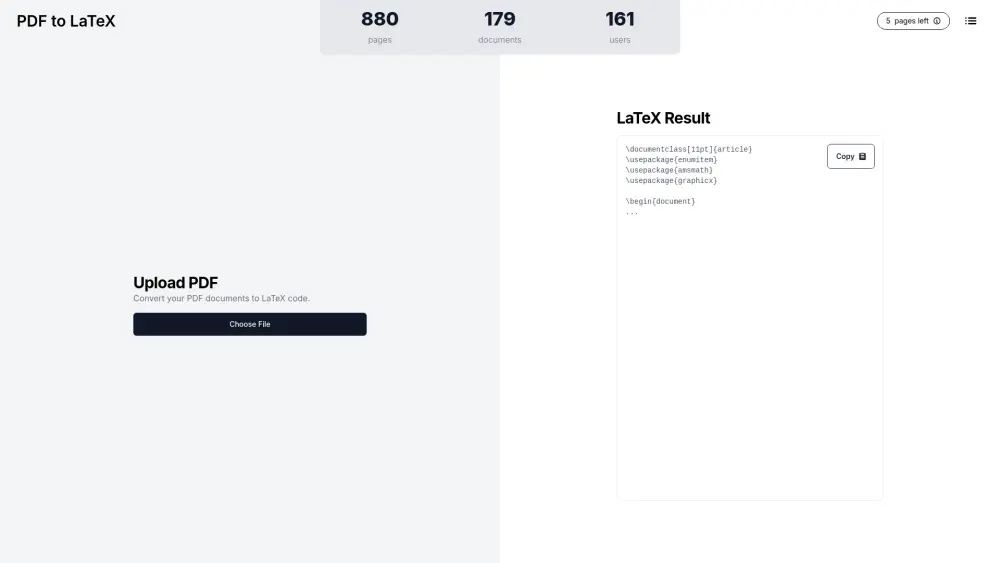PDF to LaTeX
PDF to LaTeX is an AI-powered conversion tool that transforms PDF documents into editable LaTeX markup code while maintaining document integrity and formatting.
https://pdflatex.com/

Product Information
Updated:Jun 16, 2025
PDF to LaTeX Monthly Traffic Trends
PDF to LaTeX received 138.0 visits last month, demonstrating a Significant Decline of -79.3%. Based on our analysis, this trend aligns with typical market dynamics in the AI tools sector.
View history trafficWhat is PDF to LaTeX
PDF to LaTeX is a specialized conversion service that bridges the gap between PDF documents and LaTeX markup language. It uses advanced multimodal LLM (Large Language Model) technology to accurately convert PDF content into LaTeX code, making it particularly valuable for academic, scientific, and technical documents. This tool is designed to handle complex formatting, mathematical equations, tables, and other specialized content while ensuring the converted LaTeX code can reproduce the original PDF's appearance.
Key Features of PDF to LaTeX
PDF to LaTeX is an advanced document conversion tool that uses AI-powered technology to transform PDF documents into editable LaTeX format while preserving formatting, equations, tables, and graphics. It offers multiple conversion methods including browser-based tools, Chrome extensions, and command-line interfaces (CLI), making it versatile for different user needs and workflows.
AI-Powered Conversion: Uses multimodal LLM model to analyze PDF content and generate corresponding LaTeX code with high accuracy, especially for scientific and mathematical content
Multiple Access Methods: Provides various ways to convert files including web interface, Chrome extension, and MPX CLI tool for local conversion without uploading files online
Format Preservation: Maintains original document formatting including complex elements like equations, tables, and figures during conversion
Privacy-Focused: Ensures data privacy by not storing PDFs on disk, processing them only in memory, and allowing users to delete converted texts at any time
Use Cases of PDF to LaTeX
Academic Research: Researchers can convert published papers and articles to LaTeX format for citation, modification, or reformatting according to different journal requirements
Technical Documentation: Engineers and technical writers can convert technical reports and manuals to LaTeX for easier maintenance and consistent formatting
Educational Materials: Educators can convert lecture notes and course materials to LaTeX format for better organization and easier updates
Publishing Workflow: Publishers and authors can convert manuscripts from PDF to LaTeX for professional typesetting and formatting
Pros
High accuracy for scientific and mathematical content conversion
Multiple conversion options (web, extension, CLI)
Strong privacy protection with no data storage
Cons
May not perfectly handle very complex documents
Images require manual handling after conversion
May need additional package installation or font adjustments
How to Use PDF to LaTeX
Choose a conversion method: There are several ways to convert PDF to LaTeX: 1) Use an online converter like pdflatex.com 2) Use command line tools like pdflatex 3) Use desktop software like InftyReader
Using Online Converter (Recommended for Beginners): Visit pdflatex.com or similar online converter service. This is the simplest method requiring no software installation.
Upload PDF File: Drag and drop your PDF file onto the webpage or click to select file from your computer. You can also import from Google Drive or Dropbox.
Start Conversion: Click the convert button and wait for the process to complete. The service will use AI/OCR to extract and convert content to LaTeX format.
Download Result: Once conversion is complete, download the converted LaTeX file. It will typically come as a .tex file or ZIP archive containing the LaTeX source and any extracted images.
Review and Edit: Open the converted LaTeX file in a text editor to review and make any necessary adjustments to formatting, equations, or structure.
Compile to PDF (Optional): If needed, compile the LaTeX file back to PDF using a LaTeX editor or command line tools like pdflatex to verify the output matches original.
PDF to LaTeX FAQs
PDF to LaTeX conversion is a process that transforms PDF documents into LaTeX source code using AI-powered tools. The process typically involves converting PDF pages to images first, then using multimodal LLM models to generate corresponding LaTeX code that can reproduce the original document's formatting and content.
Analytics of PDF to LaTeX Website
PDF to LaTeX Traffic & Rankings
138
Monthly Visits
-
Global Rank
-
Category Rank
Traffic Trends: Jan 2025-May 2025
PDF to LaTeX User Insights
-
Avg. Visit Duration
1.02
Pages Per Visit
43.92%
User Bounce Rate
Top Regions of PDF to LaTeX
US: 100%
Others: NAN%











